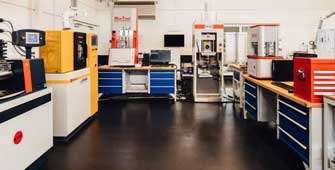 With the European Chemicals Agency having announced a proposal for the European Economic Area that will lead to a ban on all PFA (per- and poly- fluoroAlkyl) materials, due to their persistence in the environment, and further regulation of PFAs also being assessed by other countries, UK-based sealing firm James Walker has partnered with the International Institute for Nanocomposites Manufacturing (IINM), WMG (Warwick Manufacturing Group) at the University of Warwick, on a 24-month collaboration to develop novel sealing compounds that will be compliant with future PFAS regulation.
With the European Chemicals Agency having announced a proposal for the European Economic Area that will lead to a ban on all PFA (per- and poly- fluoroAlkyl) materials, due to their persistence in the environment, and further regulation of PFAs also being assessed by other countries, UK-based sealing firm James Walker has partnered with the International Institute for Nanocomposites Manufacturing (IINM), WMG (Warwick Manufacturing Group) at the University of Warwick, on a 24-month collaboration to develop novel sealing compounds that will be compliant with future PFAS regulation.
The research programme will use high throughput techniques to develop and identify novel elastomer compounds that comply with proposed PFA regulations, for use in critical industrial applications.
Conventional high performance sealing compounds rely on PFAs as these materials are resistant to extremes of temperature and aggressive chemicals. PFAs are essential to the semi-conductor, aerospace, petrochemical, defence and nuclear industries for example, and there are currently no suitable replacement materials available. Alternative sealing materials are urgently needed to substitute PFAs.
This collaboration will draw on the WMG ‘s extensive expertise in Elastomer and Polymer technology, and its reputation for working successfully with industry, with a history of partnering with pioneering entities, including Jaguar Land Rover, BAE Systems and Goodyear amongst many others.
Dr Chaoying Wan, Leader of Functional Polymers and Nanocomposites at WMG, University of Warwick explains, “Collaborating with James Walker to develop alternatives for PFAS seals is an important and exciting opportunity. Our elastomer research facility is supported by High Value Manufacturing Catapult Centre (HVMC), equipped with the latest technology, including a rubber process analyser (RPA) with wide temperature range – it is the only one in the UK, and one of only a few in the world with the capability to simulate dynamic elastomer performance at very low temperature. This function is extremely useful to compare differences in formulation design for applications such as high pressure or low temperature sealing. I am very much looking forward to working with the James Walker team on the development of new material options for high performance sealing applications and advancing our knowledge of polymer formulation and performance.”
The research partnership will commence work in June this year and it is expected that this will provide an important boost to work that James Walker is already undertaking with its customers and supply chain aimed at developing the next generation of sealing solutions, including alternatives to current PFA options.
Dr Mike Eason, Technical and Quality Director at James Walker commented. “Industrial dependence on PFA elastomers is a global issue with supply chain impact already seen. I am delighted that we will work with Dr Wan and her team to identify and develop materials which will help industry be compliant with the proposed regulations. This partnership will accelerate James Walker’s development of seal materials for critical industry. WMG has small scale, advanced, mixing capability, with knowhow regarding nanofillers and polymer science that will allow James Walker to rapidly design, manufacture and screen bench-scale test formulations. I believe the combination of James Walker’s history and expertise in critical industrial sealing together with WMG’s state of the art capabilities will enable rapid development and commercialisation of materials. James Walker is committed to developing solutions to the PFAS regulations faced by global industry.”
Formed in 2022 the main scientific focus of the WMG facility is to bring together research from across rubber composite processing and synthetic polymer chemistry – including manufacturing technology, multiscale characterisation, and prototyping of sustainable rubber products. High performance elastomers are essential components in applications across a range of critical sectors, including vehicle tyres, footwear and automation and high performance sealing.
Capabilities within the elastomer research facility include a twin-roll mill for rubber compounding; automated compression moulding and moving die rheometer (MDR); abrasion testing; and a state of the art dynamic rubber process analyser (RPA), which enables advanced analysis of rubber networks over a temperature range of -40°C to 232°C, and a wide frequency range, as well as unique rheological characterisation at large amplitude oscillatory shear (LAOS).
